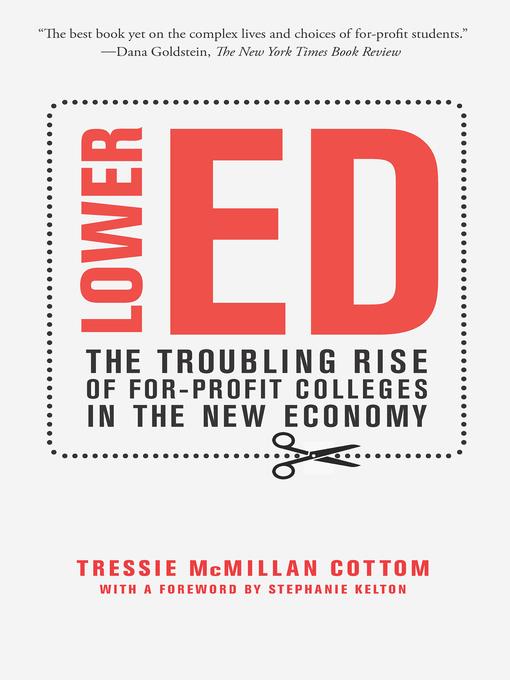
Lower Ed
The Troubling Rise of For-Profit Colleges in the New Economy
کتاب های مرتبط
- اطلاعات
- نقد و بررسی
- دیدگاه کاربران
نقد و بررسی

December 15, 2016
An informal sociological study of diploma mills and their often ripped-off discontents. Before becoming a sociology professor at Virginia Commonwealth University, sometime Slate columnist Cottom worked at a for-profit college whose machinations she came, once understanding them, to despise. In this slender book, she lays out a case against a system that engenders predation and that profits, in the end, from social and economic injustice. The unknown number of for-profit students--variously said to be between 1.2 million and about twice that many enrollees--pays about 20 percent more than at a "flagship public university" for an undergraduate degree but about four times more than an associate's degree at a community college. What drives this preyed-upon class, whose members, the author rightly adds, are not necessarily academically inferior? In part, perhaps, the promise of a degree more easily attained than at a regular academic institution. However, writes Cottom, another factor is that most of these students, ill-educated to begin with, simply have no preparation in navigating bureaucracies and no way of gauging the difference between one school and the next, down to knowing what the cost might be. "Traditional colleges," she writes, "benefit from a deeply entrenched cultural faith in the value of college, particularly among higher-status groups." For the lower-status and the aspirational, college is a way of getting one's ticket punched, to get a credential that might lead somewhere better. In the end, Cottom suggests, by their very existence, with reassuringly august names like the University of Phoenix and ITT Technical Institute (and, perhaps most notoriously, Trump University), these schools, which are often publicly subsidized to some extent, are "an indicator of social and economic inequalities and, at the same time, are perpetuators of those inequalities." Cottom does a good job of making the name "Lower Ed" stick, and she makes a solid case for reviewing the entire system of higher education for openness of opportunity.
COPYRIGHT(2016) Kirkus Reviews, ALL RIGHTS RESERVED.

February 1, 2017
Cottom (sociology, Virginia Commonwealth Univ.) previously worked in enrollment at for-profit colleges in the South. Her experiences there shook her faith in the "education gospel"--college as the sole ticket to social mobility--and inspired her doctoral research on this fast-growing sector of higher education. Her book stands out for seeking to explain the appeal of schools that promise heavy student debt burdens with few of the perks--such as libraries--available at traditional institutions. This explanatory focus demonstrates how the for-profit sector's boom coincided with the rise of the "new economy" during the 2000s. Most helpful is a chapter exploring the differences in "customer service" between for-profit and traditional institutions--chief among them, that the former gets students in classes as quickly as possible, while the latter forces them to navigate complex bureaucracies. Despite recent scandals involving for-profit titans such as ITT Technical Institute and Corinthian Colleges, this book effectively shows why prevailing U.S. social and economic conditions will guarantee a steady market for such enterprises. VERDICT Some readers will quibble that the author's epilog discussing "solutions" ignores practical, public policy-oriented suggestions on how to better rein in this shady sector of the higher-education landscape. Aside from this minor point, however, this is a valuable study recommended for all public and academic libraries.--Seth Kershner, Northwestern Connecticut Community Coll. Lib., Winsted
Copyright 2017 Library Journal, LLC Used with permission.

























دیدگاه کاربران